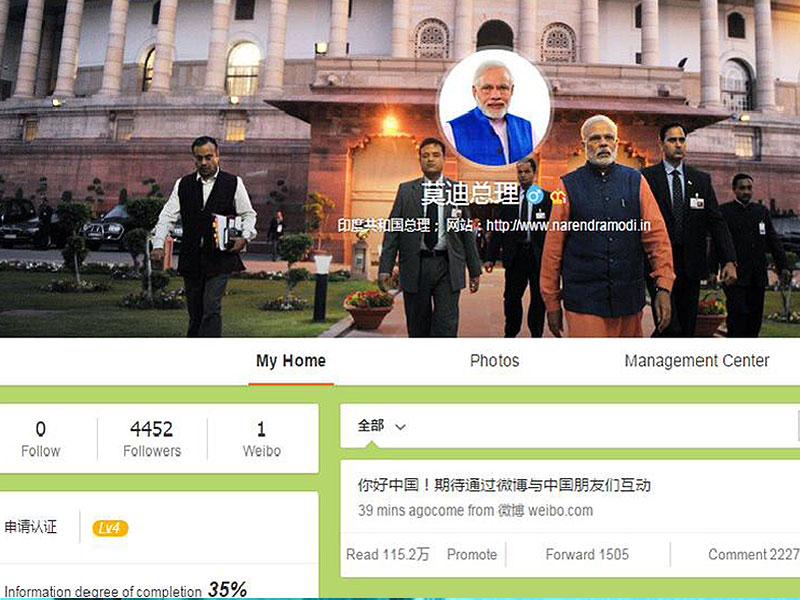Why everyone -- from Narendra Modi to Tim Cook -- is joining Weibo
Prime Minister Narendra Modi’s decision to join China’s wildly popular social media platform, Weibo, was a studied decision.

Prime Minister Narendra Modi's decision to join China's wildly popular social media platform, Weibo, was a studied decision. Modi consulted two of India's senior most diplomats and China-hands - foreign secretary S Jaishankar, who served as ambassador here for four years till the end of 2013 and the current envoy, AK Kantha, a fluent Mandarin speaker.
Modi's debut on Weibo, a Twitter and Facebook hybrid, did two things: first, it opened up China's thriving and chattering -- if censored -- social media world with hundreds of millions of members to the Indian PM; it sent the message to the Chinese that here was an Indian leader willing to connect with them.
Second, it allowed Modi to cleverly sidetrack the blocking of Twitter and Facebook in China; he obviously could not have broken Chinese law by tweeting about how fascinating the Terracotta Soldiers of Xian were or how he felt Buddhism connected the two countries during his three-day stay in China.
It might have been a precedent for an Indian politician but it was not the first time that a foreign leader had signed up on Sina Weibo, the most popular Weibo (microblog) platform in China.
According to the SINA English website, in September 2013, Venezuela's President Nicolas Maduro opened a micro-blog account before visiting the country. "More than 200 leaders of foreign countries and international organisations, including British Prime Minister David Cameron, had opened micro-blog accounts as of April last year," it said.
Read: PM Modi debuts on Weibo, told Arunachal belongs to China
And on Monday, Apple's Tim Cook joined Sina Weibo, attracting more than 200,000 followers in about 60 minutes.
His first message, written in both English and Chinese, reads "Hello China! Happy to be back in Beijing, announcing innovative new environmental programs."
State media reported that it had been reposted more than 15,000 times and received 20,000 comments in just one hour.
For Cook, it is also understandable why he joined Weibo though he has certainly taken his time to log on.
"China is now home to around 35% of world-wide iPhone users, topping the United States as the largest market for iPhones for the first time. Apple has also overtaken Chinese company Xiaomi for the largest share in China's domestic smartphone market, according to an industry report published on Monday" a state media report said soon after Cook joined Weibo.
Read: PM Narendra Modi gives Twitter pep talk to India's World Cup warriors
Tesla's Elon Musk, who opened an account in 2014, now has more than 1 million followers in China.
It is not surprising that many political and business leaders besides personalities from the entertainment industry and public figures join Weibo. According to Sina, by the end of 2013, Weibo had more than 500 million members, millions among them active, daily users. At least a 100 million messages are posted and exchanged. Many government departments too now have Weibo accounts where they publish information and share updates about what the government is doing.
Weibo has also given the young in China a platform to talk about issues that are personal as well as public. It often becomes a medium to air political views as well - of course as long as those views are not construed to be critical of the Communist Party of China (CPC) or at loggerheads with government policy; such posts are immediately removed but sometimes not before they have been posted and reposted many times.
The government can use the medium according to convenience as well.
For example, soon after Modi put up his first post last week, he was greeted by a barrage of comments about South Tibet - as Arunachal Pradesh is known here - belonging to China. The censors toiling behind the Great Firewall of China conveniently allowed those comments to remain as they voiced the government's official stand on the issue.
There was a similar online outcry when, during a product launch in New Delhi in January, Xiaomi showed Arunachal Pradesh to be part of India.
The Weibo platform has evolved in the last few years: changing from a Twitter-Facebook clone to something which has adopted from both the platforms but added its own characteristics.
Since Weibo attracts the young and the educated, following the trends on it gives an indication about what the young in China are thinking about. For those trying to catch a glimpse of China, and can use an effective translation application, Weibo offers a convenient window of opportunity to learn about the country.
Catch all the Latest Tech News, Mobile News, Laptop News, Gaming news, Wearables News , How To News, also keep up with us on Whatsapp channel,Twitter, Facebook, Google News, and Instagram. For our latest videos, subscribe to our YouTube channel.

























